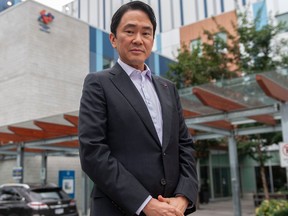My Account
Why being admitted to hospital in B.C. may soon mean being sent home instead
Fraser Health opened B.C.'s first virtual hospital unit, where 150 psychiatric patients have been treated from home. Experts say it is the way of the future.

Article content
After spending nine weeks in Peace Arch Hospital’s psychiatric ward, Sharon Leitch Joss knew she was ready to be discharged. But she was very worried about returning to her White Rock apartment after so much time in institutional care.
“Because of the volatile journey that I’ve had in the last six months, since March, my confidence had taken a hit,” recalled Leitch Joss. “On being ready to come home, I was really nervous because I live alone.”
Article content
Article content
In mid-August, her physician suggested a surprising solution — she could remain admitted to the psychiatric ward, but still move home as part of Fraser Health’s virtual hospital psychiatric unit, the first of its kind in B.C.
It was “the best thing” for her recovery, said Leitch Joss, who knows a thing or two about health care: She’s been a nurse for 40 years and teaches nursing to university students.
The virtual unit, launched quietly a year ago and announced publicly this week, has treated about 150 patients who were sent home with an iPad and basic health care gear, and treated online by doctors and nurses.
“We are equivalent to what a brick-and-mortar hospital unit would provide for a patient,” said Radhika Khosla, a psychiatric nurse and the unit’s operations manager.
“The difference is they’re not occupying or using a bed in the hospital. They’re actually in the comfort of their own home, with their family, their friends, their pets.”

The concept of virtual health isn’t new. It started to gain popularity as both patient waiting times and new-hospital construction costs grew, and was boosted further when the COVID-19 pandemic forced medical staff to use video platforms to “see” their patients.
Article content
Most B.C. health authorities now have various services that allow patients to connect with medical professionals online.
Some run the hospital-at-home program, which offers home visits and remote monitoring for people who require acute care for mild or moderate conditions. It was piloted in 2020 by Island Health, which today offers the virtual service through two Victoria hospitals to eligible patients who don’t have to be tied to any specific hospital unit, a spokesperson said.
Fraser Health, though, has created what appears to be the first virtual hospital unit in the province with a staff of more than 30 people. About eight people work each day in the 24-hour unit, some doing outreach and others providing online psychiatric services to eligible patients throughout the authority, which stretches from Burnaby to Hope.
Psychiatry was the obvious choice for the first virtual unit because demand was high due to mental health and substance use worsening during the pandemic, said the Fraser Health CEO, Dr. Victoria Lee. She has plans to introduce additional virtual hospital units in Fraser Health, and has sought advice from health leaders in other countries.
Article content
Article content
“There have been successful examples of virtual hospital services elsewhere in the world, whether it’s Israel, the U.S. or Australia,” she said.

The Canadian Institute for Health Information said in a 2022 report that Canada had “historically lagged behind its international peers” when it comes to virtual health technologies, but that has changed in recent years.
“In March 2022, about half of Canadians reported that they had been offered a virtual (medical) visit,” the report said.
In April, the institute announced it would collect more data to better guide future spending on virtual care, noting additional information is needed on its impact on medical spending and patient outcomes.
Leitch Joss has nothing but gratitude for Fraser Health’s virtual unit. She hit “a real low point” with anxiety and depression earlier this year, due to a number of colliding factors that included the strain of her elderly parents’ ailing health, other life pressures and severe reactions to psychiatric medication.
After being admitted to the virtual unit following her nine-week in-patient stay, she was provided with a “kit” of gear that a peer support worker showed her how to use at home: an iPad to communicate with medical staff, and machines that test vital signs such as temperature, pulse, blood pressure and oxygen saturation.
Article content
Leitch Joss had daily hour-long video calls with a psychiatrist, which often included other medical staff such as a pharmacist and psychologist. Nurses checked in with her about three times a day and, similar to ringing a bell at the side of a hospital bed, she could phone health workers 24-7 with any concerns.
“I actually found the virtual unit had more on-hand resources than the in-patient unit has, because they are so stretched for time and availability” in the hospital, Leitch Joss said. They would “do all the safety checks. Ask how you’re doing. Any concerns? How’s your day been? And you can do that virtually so that they’re seeing your face.”
Leitch Joss shared her story to explain the benefits of the virtual program, and to strees that any person from any walk of life may one day need mental health help, even a veteran registered nurse with a master of science in nursing from the University of B.C.
Patients like Leitch Joss can be offered a spot in the virtual unit through any Fraser hospital psychiatric ward or emergency room, said Khosla, who began helping to plan this new-age unit in late 2021. The criteria for acceptance includes being stable, not posing a risk to themselves or others, not needing several in-hospital treatments, and living in a safe place.
Article content
The unit also offers home visits, when patients need them, by staff based in Abbotsford and Surrey.
Patients are given a box with supplies for games and activities so they can participate when the unit’s recreational and occupational therapists run online workshops that range from yoga to life skills.
“You can get this 24-hour wraparound care — nursing support, all this rec-rehab care — but you can also do it from home, which is wonderful because that’s not ever been done before,” Khosla said. “I’m excited to see our unit be the forefront of all that change.”
The virtual unit’s patients have ranged in age from 18 to 70, and include youth who are afraid to go to the hospital and people who hesitate to seek help because of stigma.

Others are new mothers who suffer serious postpartum depression after having their babies, said Dr. Anson Koo, Fraser Health’s chief psychiatrist.
“In the past, they would have to be admitted to a psychiatric unit and separated from their babies,” he said. Now “these moms are able to receive in-patient psychiatric level care in the comfort of their homes with their babies … continuing to breastfeed.”
Article content
A survey of patients in the virtual unit, Koo said, found three out of five said it was much better than being a patient in a hospital ward, while the remainder were equally split between it being somewhat better or about the same as the traditional model.
“It’s because they want to get care at home,” he said.
About five per cent of patients, however, had to leave the virtual unit and return to a traditional hospital for a variety of reasons, including being too unwell to stay home, Koo said.
A handful of patients found the video calls and other technological requirements too taxing, Khosla added. The program has since made changes, such as creating a calendar that autofills with the patients’ appointments, rather than overloading them with separate email invitations, she said.
The unit has a total of eight patients at a time, who typically stay admitted for about two weeks before being discharged and connected to community mental health support.
Leitch Joss was released from the virtual unit at the end of August, after about 14 days. “I felt I was comfortable in being in my own home alone,” she said, adding she plans to return to teaching this fall.
Article content

The global management consulting firm McKinsey published a report in May that found virtual care could address rising demand, costs and patient dissatisfaction in health care. It analyzed health services in Australia, which it called a “bellwether” country for virtual hospital care, and found about 11 per cent of patients admitted to hospital beds could be treated at home.
If a virtual Australian hospital treated 9,500 patients a year, it would free up 47,500 bed-days annually and reduce spending on new hospitals by up to $90 million, the report said. There are also potential savings for operating budgets: The cost for a patient’s “episode of care” in Australia was $1,000 lower in a virtual unit compared to an in-patient ward, mainly due to reduced medical and labour costs, McKinsey found.
The report also said 90 per cent of Australians who received virtual care were somewhat or very satisfied, mainly due to convenience and avoiding being with other patients.
The U.K. plans to increase “virtual ward capacity by 40 to 50 virtual beds per 100,000 people by December 2023, which could allow more than 17 per cent of total admissions to be treated in virtual hospitals,” the McKinsey report says.



